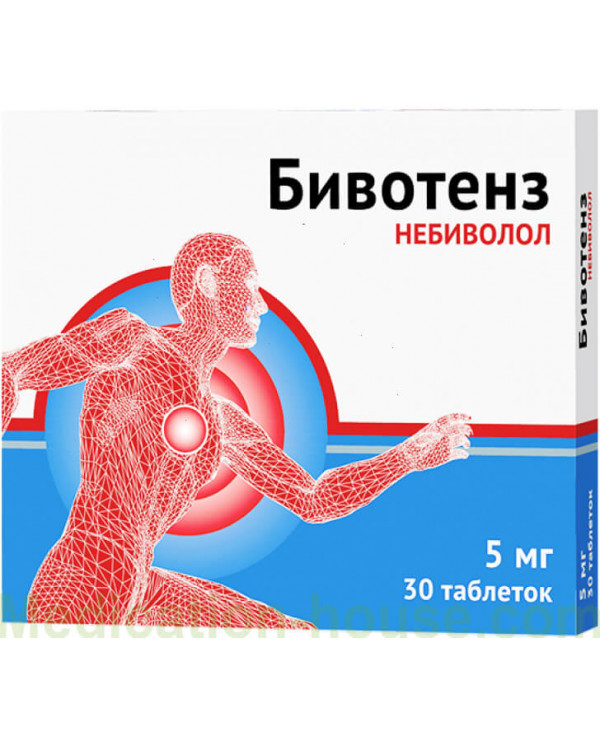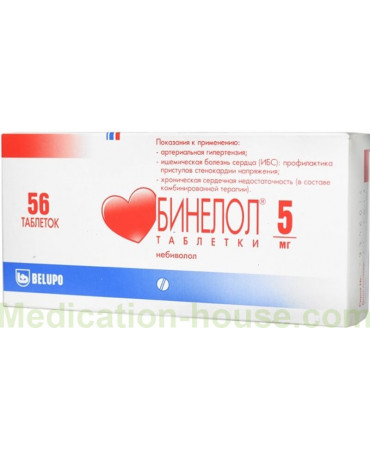Instruction for Bivotenz
Reed more and buy Bivotenz on this page
Release form and composition
Bivotenz is available in the form of tablets: white or almost white, flat-cylindrical, round, with a chamfer and a cross-shaped line on one side (7, 10, 14, 20 or 30 pcs. In blister strip packaging made of polyvinyl chloride film and printed aluminum lacquered foil, in cardboard box 1, 2, 3, 4, 5, 8, 9, 10 or 12 blister packs; 7, 10, 14, 20, 28, 30, 40, 50 or 100 pcs. in polymer cans for medicines or jars from polyethylene terephthalate, in a cardboard box 1 can).
Composition for 1 tablet:
active substance: nebivolol (in the form of nebivolol hydrochloride) - 5 mg;
auxiliary components: povidone-K25, magnesium stearate, microcrystalline cellulose, colloidal silicon dioxide, lactose, croscarmellose sodium.
Indications for use
CHF (chronic heart failure) (in combination therapy);
IHD (ischemic heart disease) (for the prevention of angina attacks);
arterial hypertension.
Contraindications for Bivotenz
Absolute:
acute heart failure;
cardiogenic shock;
severe arterial hypotension;
AV block II and III degree (in the absence of an artificial pacemaker);
severe disorders of peripheral circulation (Raynaud's disease, intermittent claudication);
CHF in the stage of decompensation, requiring inotropic treatment;
sick sinus syndrome, including sinoatrial block;
bradycardia (heart rate less than 60 beats per minute);
severe liver dysfunction;
pheochromocytoma (without the simultaneous administration of alpha-blockers);
a history of bronchial asthma and bronchospasm;
myasthenia gravis;
metabolic acidosis;
depression;
lactase deficiency, lactose intolerance or glucose-galactose malabsorption syndrome (since the drug contains lactose);
children and adolescents under 18 years of age (since the safety and efficacy of the drug in children have not been established);
period of breastfeeding;
the simultaneous use of sultopride and floktaphenin;
hypersensitivity to nebivolol or ancillary components of the drug, as well as other beta-blockers.
Relative (Bivotenz is used with caution):
impaired renal and / or liver function;
disorders of peripheral circulation of mild to moderate severity (possibly increased symptoms);
Prinzmetal's angina;
AV block I degree;
COPD (chronic obstructive pulmonary disease);
hyperthyroidism;
psoriasis (the drug is prescribed only after a thorough assessment of the expected benefits and the possible risk of worsening the course of psoriasis);
diabetes mellitus (nebivolol can mask some signs of hypoglycemia);
burdened allergological history;
simultaneous desensitizing treatment;
the period of pregnancy (the drug is used only in cases where the expected benefit to the mother outweighs the possible risk to the fetus);
advanced age over 65 years.
Method of administration and dosage
Bivotenz tablets are taken orally, regardless of the meal. The tablet is divided into equal parts according to the risk or swallowed whole with a sufficient amount of water or other liquid. The drug should be taken at the same time.
With ischemic heart disease and arterial hypertension, the average dose of the drug is 2.5–5 mg once a day. The optimal therapeutic effect is achieved after 1–2 and sometimes 4 weeks of treatment.
The maximum daily dose of Bivotenz is 10 mg at a time and is prescribed if necessary.
Nebivolol can be used both as the sole therapeutic agent and in combination with other antihypertensive drugs.
With stable CHF, treatment begins with a gradual increase in the dose until the optimal maintenance dose is reached, which is individual for each patient. The patient should not have had acute attacks during the last six weeks.
In CHF, therapy with Bivotenz should be started only if the patient is clinically stable during the last two weeks. When choosing a dose, it is necessary to adhere to the following scheme: the daily dose of 1.25 mg can be increased to 2.5 mg per day, then up to 5-10 mg per day. The interval between successive increases is at least two weeks. After taking the first dose and with each dose increase, the patient should be under medical supervision. The maximum dose of the drug is 10 mg per day.
In case of intolerance to nebivolol or worsening of CHF during titration, it is recommended to reduce the dose or immediately discontinue the drug (with the development of cardiogenic shock, a sharp drop in blood pressure, AV blockade, acute pulmonary edema or symptomatic bradycardia).
Treatment of stable CHF is long-term. It is not recommended to stop it abruptly (in the absence of good reason), since a temporary exacerbation of the course of CHF is possible. Cancellation of the drug Bivotenz is carried out gradually, reducing the dose by half within a week.
In renal failure (creatinine clearance less than 20 ml / min) and in patients over 65 years of age, nebivolol is prescribed in an initial daily dose of 2.5 mg, then it can be increased to 5 mg (if necessary). Increasing the dose is carried out with extreme caution.
Side effects
gastrointestinal tract: often - diarrhea or constipation, nausea; infrequently - vomiting, flatulence, dyspeptic disorders;
respiratory system: often - shortness of breath; infrequently - bronchospasm;
cardiovascular system: very often - bradycardia; often - orthostatic hypotension and AV block of the 1st degree (in patients with CHF), aggravation of the course of CHF; infrequently - the progression of the existing intermittent claudication, a pronounced decrease in blood pressure, heart failure, AV blockade / slowing down of AV conduction; very rarely - Raynaud's disease;
nervous system and psyche: often - dizziness, paresthesia, headache, weakness; infrequently - depression, nightmares; very rarely - psychosis, fainting, hallucinations, confusion;
sense organs: frequency unknown - dry eyes, blurred vision;
skin and subcutaneous tissues: often - edema (in patients with CHF); infrequently - itching, erythematous skin rash; very rarely - worsening of the course of psoriasis; frequency unknown - baldness;
reproductive system: infrequently - erectile dysfunction;
immune system: frequency is unknown - increased individual sensitivity, Quincke's edema;
general reactions: very often - dizziness (in patients with CHF); often - edema, increased fatigue, intolerance to nebivolol (in patients with CHF); very rarely - cyanosis / coldness of the extremities (in patients with CHF); infrequently - hyperhidrosis, photodermatosis.
Special instructions
Beta-blockers should be withdrawn gradually, over 10 days (in patients with coronary artery disease - up to 14 days).
At the beginning of therapy with Bivotenz, it is necessary to measure blood pressure and heart rate daily.
Nebivolol is less effective in smokers than in non-smokers.
Before surgery, it is necessary to warn the anesthesiologist about the use of beta-blockers.
During treatment with the drug, it is possible to reduce the production of tear fluid, which should be taken into account by patients wearing contact lenses.
In elderly patients, laboratory indicators of renal function should be monitored every 4–5 months, and in patients with diabetes mellitus - the level of glucose in blood plasma.
Bivotenz does not affect the speed of psychomotor reactions, however, while taking it, you may experience a feeling of fatigue and dizziness, so during the treatment period it is recommended to refrain from driving a car and engaging in other potentially dangerous activities.
Drug interactions
When used together with amiodarone, diltiazem, verapamil and class I antiarrhythmics, it is possible to deteriorate AV conduction and increase the negative inotropic effect; with sympathomimetics - the pharmacological activity of Bivotenz decreases; with drugs for anesthesia - the risk of arterial hypotension increases and reflex tachycardia may be suppressed; with barbiturates, tricyclic antidepressants, phenothiazine - the antihypertensive effect of nebivolol may increase; with cimetidine - an increase in the plasma concentration of nebivolol is possible; with nitroglycerin, slow calcium channel blockers or antihypertensive drugs - severe arterial hypotension may develop; with oral hypoglycemic agents and insulin - signs of hypoglycemia may be masked.
Simultaneous intravenous administration of verapamil is contraindicated, since there is a risk of cardiac arrest.
Serotonin reuptake inhibitors or other drugs that are metabolized with the participation of the isoenzyme CYP2D6 increase the plasma concentration of nebivolol and slow down its metabolism, which increases the risk of bradycardia.
Terms and conditions of storage
Store in a dark place, out of the reach of children, at a temperature not exceeding 25 ° C.
The shelf life is 3 years.
Terms of sell
You don't need a prescription to buy Bivotenz.


